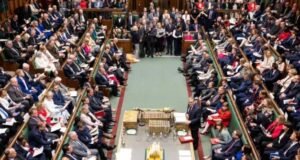 David Cameron has said his government is “not ruling anything out” when it comes to helping to
David Cameron has said his government is “not ruling anything out” when it comes to helping to
rescue the British steel industry, but warned that he does not believe that nationalisation is the right
answer.
The idea of placing plants in public ownership following the financial crisis that led to Tata Steel
deciding to sell its British operations was seen as the least viable option during an emergency
meeting between the prime minister and his ministers.
The idea of part-nationalisation appeared to be under consideration on Wednesday morning, but
the Guardian understands that government officials had warned it could carry a price tag of £1.5bn a
year.
Ideas that are being seriously considered include a cash injection into the industry while a buyer is
found. Ministers are also trying to persuade Tata Steel to keep things afloat. But a company source
told the Guardian they had already been looking for a buyer for 18 months and were not ready to
give the operation away for “nothing”.
The Labour leader, Jeremy Corbyn, had said he was “shocked” by the idea of ministers taking
nationalisation off the table, as estimates suggested there were up to 40,000 jobs on the line.
Speaking after the meeting, Cameron promised the government would do “everything we can”.
“The situation is of deep concern,” he admitted and there were “no guarantees of success”. He said
he knew how important the jobs were – in Port Talbot and other steel plants across Britain.
“We are not ruling anything out. I don’t believe nationalisation is the right answer, what we want to
do is secure a long-term future for Port Talbot and for other steel plants in the UK.”
The prime minister said his ministers had been working for months to help the industry, “to make
sure that we procure British steel for our ships and for other vital industries in the UK”.
“We’ve cut the energy costs – and with others in Europe we’ve made sure that there are proper
penalties for those that dump cheap steel on the market. But this industry is in difficulty across the
world, there has been a collapse in prices, there is overcapacity, but we are doing everything we
can.”
His defence of the government followed criticism from some who said ministers had “rolled out the
red carpet” for Beijing by voting against changes to the “lesser duty rule” in Europe, which would
allow tougher action on Chinese dumping including higher tariffs.
The crisis has triggered a row over whether Britain’s place in the EU has worsened the situation and
placed British jobs at risk. Pro-EU supporters point out that other European countries have pushed
for higher tariffs and done more to protect their industries, but Brexit campaigners point out how
the US has been much more effective at protecting its steel industry.
The shadow chancellor, John McDonnell, had called on the government to “get a grip” as Cameron
began the emergency discussions.
McDonnell reiterated Labour’s call for a temporary nationalisation of the Indian-owned company’s
UK plants and said Cameron should swiftly come up with a plan to save jobs, one on which he could
get cross-party consensus.
“The prime minister could take a lead in this. The government’s been in a bit of disarray over the last
48 hours,” McDonnell told BBC Radio 4’s Today programme, noting that the junior business minister
Anna Soubry had hinted at possible nationalisation before the business secretary, Sajid Javid, ruled it
out.
“There’s a bit of chaos in government and we’re trying to say, look, get a grip now and then come to
parliament with a clear plan that hopefully we can back on a cross-party basis,” McDonnell said.
Javid was not present at the Downing Street meeting, because he was still travelling back from
Australia, while George Osborne was in Paris for a meeting of the G20 finance ministers. Osborne
said he had raised the “vital issue of steel” during his meeting.
Those present at Cameron’s meeting in London included Soubry, Alun Cairns, the Welsh secretary,
and Stephen Crabb, the work and pensions secretary and former Welsh secretary. Arriving at
Downing Street for the meeting, Soubry was asked if the government would let Welsh steel fail. “I
hope not,” she replied.
Cameron returned from holiday in Lanzarote on Wednesday, while Javid was flying back from
Australia after Tata announced it would be selling off British plants including the Port Talbot works in
south Wales as well as sites at Rotherham in South Yorkshire, Corby in Northamptonshire and
Shotton in Deeside.
The company said it was losing £1m a day, with a source claiming that the government’s failure to
back calls in Europe for higher tariffs against cheap Chinese imports was the last straw, prompting
the decision to sell the business that was once British Steel and more recently Corus.
The decision to sell the operation could cost 15,000 jobs inside the company but the thinktank IPPR
said that up to 40,000 could be affected more widely across the supply chain.
McDonnell said Labour was proposing a four-point plan, comprising temporary nationalisation,
restructuring of the business, reduced business rates and the use of British steel in public
procurement.
Asked whether the billions of pounds in likely spending to achieve this could be justified, McDonnell
said that the industry could be made sustainable if it could “weather the storm” it currently faced.
“Because in the long term it will prove cost-effective,” he said. “It isn’t just the cost of losing those
jobs. As we’ve seen elsewhere, it’s the cost of devastation of whole communities. Remember, we
will be paying out in unemployment and other benefits to those people who lose their jobs. Isn’t it
better to keep them in work?”
Also speaking on the Today programme, Len McCluskey, general secretary of the Unite trade union,
said there was a comparison to be made with the bailout of the banks amid the 2008 financial crisis.
“Yes. Undoubtedly,” he said. “The National Audit Office tells us that we put one thousand billion of
British taxpayers’ money into the banks in order to secure their continued survival because the
governments of the day thought it was important for the country as a whole and that’s precisely
what we should be doing now.
“That’s why we should be appealing to the prime minister to take personal responsibility to recall
parliament. This is an industrial crisis of enormous proportions, not just affecting the 40,000 or
50,000 or 60,000 jobs that you mentioned, but it indeed affecting the whole of our manufacturing
base.
“It’s absolutely essential that a foundation industry like steel is protected in order that we can have
the much vaunted ‘march of the makers’ that the government talks about.”
 Weekly Bangla Mirror | Bangla Mirror, Bangladeshi news in UK, bangla mirror news
Weekly Bangla Mirror | Bangla Mirror, Bangladeshi news in UK, bangla mirror news







